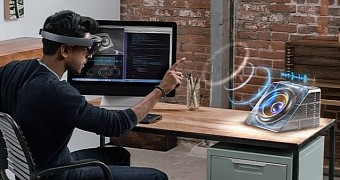While Microsoft appears to be very close to leaving the mobile market altogether (despite rumors of a mobile makeover in the works), Apple is all-in on smartphones, trying to continue innovating with the iPhone, but also facing fiercer competition from rivals like Samsung and Huawei.
But while the two companies are adopting different directions for their mobile push, both agree on one thing: the traditional smartphone as we know it is dead already and focusing on other “mobile” approaches seems to become more of a priority.
Apple and Microsoft are heading towards a strategy that puts the focus on smartglasses, and the two technology giants are investing billions of dollars in augmented reality (AR) projects that could once replace smartphones altogether.
Apple’s push in AR
Even though it’s working at full speed on getting the next iPhone right, and planning ahead for the next generations, Apple is also focusing on AR, with smartglasses wearing the company’s logo all but confirmed at this point.
More recently, it was rumored that Apple considered several prototypes of a headset, one of which featured a 3D camera without a display, but using the iPhone screen in this regard. While this is indeed a good approach that other companies are already using, Apple is said to be looking into something else, just because of this thing, as it wants its headset to be more innovative and feature its very own screen to overlay AR content on the real world.
The Financial Times said Apple was still trying to make a decision in this regard, but there are good chances the company goes for the second approach to make the smartglass independent from the iPhone, especially because they do see a future beyond the phone.
As far as the debut of the device goes, there are rumors that Apple wants to launch it in 2018, but no confirmation has been offered until now. And yet, Cupertino is already dropping hints that AR is the feature, with iOS 11 featuring ARKit, a development toolset that allows app makers to use the iPhone camera for AR implementations.
Microsoft says it loud and clear: smartphones are dead
While Apple is still exploring the world beyond the smartphone, Microsoft is nearly there, with HoloLens becoming a pioneer of this transition.
Microsoft’s executives said it loud and clear several times that smartphones are dead, with HoloLens creator Alex Kipman emphasizing earlier this year that “smartphones are yesterday’s news, the phone is already dead, but people just haven’t realized.”
“The potential of these devices is that they could one day replace your phones, TVs, and all these screens. Once your apps, videos, information, and even social life are projected into your line of sight, you won't need any other screen-based gadgetry,” he said, forecasting that AR-based wearables would take over phones.
As compared to Apple, Microsoft has given up on mobile and replaced it with AR on its list of priorities, though just like in the case of the Cupertino-based rival, plans on how smartphones would be rendered obsolete remain unknown.
Without a doubt, AR is a trend that’s growing at an insane speed, and with two of the largest tech giants betting big on it, it’s definitely here to stay. But as far as the demise of the smartphone goes, that’s going to be something that won’t happen overnight.

 14 DAY TRIAL //
14 DAY TRIAL //